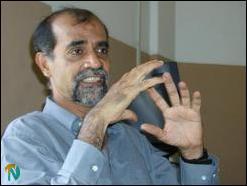Tribalist irrationality permeates Sinhala political rhetoric - Uyangoda
[TamilNet, Friday, 20 February 2004, 03:31 GMT]
Unless extremely prudently handled, developments surrounding the forthcoming election may set in a new political process in which "Sri Lanka's future as a nation-state unit might be at a great risk" warns Professor Uyangoda, in a sobering analysis of the political campaign which he says is "likely to be full of rhetoric of the retrograde kind," in an opinion column that appears in the Friday edition of the Daily Mirror.
Professor Uyangoda identifies two unresolved, closely intertwined and urgent issues that are at the core of Sri Lanka's turmoil. "The first concerns the taking forward of the stalled negotiation process between the government and the LTTE to a new, second phase. The second,... is about enabling the Sri Lankan economy to recover rapidly and then move into a phase of accelerated economic growth, along with a programme to ensure equity and social justice...."
Whereas, handling of these two tasks requires multilateralism, Prof.Uyangoda points out that the two political formations of Sri Lanka's deeply divided polity have adopted unilateralism where the "political forces are not ready to even dialogue across their own barricades." He adds that "in our political culture, election campaigns are not meant to facilitate dialogue; they only promote rhetorical warfare. Ultimately, it is the rhetoric, not reasoned deliberation, that defines trajectories of change."
Prof.Uyangoda says that seeds for a nasty campaign have already been sown by Ms.Kumaratunge, SLFP colleagues and JVP in their actions leading to the dissolution of the parliament setting "the tone for an extremely hostile election competition with the UNF." "UNF is likely to respond in kind, with bitter enmity towards the new Alliance," he believes.
While the "Sri Lankan polity would be divided along three axes - the UNF, the Alliance and the LTTE/TNA," the Colombo Don writes that the "utterly rancorous political rhetoric" that is likely to come from the first two camps will be "the most damaging to Sri Lanka's political recovery."
Professor Uyangoda wonders if the new political forces deem "the two years of absence of war too long a period to tolerate" and if "there is some secret desire, an unconscious yearning, for violence and bloodshed again," by pointing to the general lack of passion for peace and both parties displaying excitement and romance for "negative political mobilization in enmity and hostility."
Professor Uyangoda says that all communities have been traumatized by two decades of war and that political irrationality caused by war trauma is manifesting in different forms.
But writing about the "growing psychology of irrationality in the Sinhala psyche," which he has observed closely,
Uyangoda says, "we see a tribalist irrationality which seeks delight in multiple fragmentation of the polity...Its manifestations, often expressed in an idiom of tribalist isolationism and stone-age symbolism, seem to enjoy popular support as well as intellectual rationalization...[the Sinhala political leaders] all appear to suffer from a horrendous weakness - self-doubt. As a result, no political party seems to take the risk of telling the Sinhalese people, the majority community, whose consent is absolutely crucial for any meaningful political reform measure to be legitimate, that they will have to be prepared for sharing state power with Tamil and Muslim communities."
Noting that "political leaders in a fragmented polity cannot become agents of constructive change," he says, any attempt by the Freedom Alliance to "try out constitutional change through the device of constituent assembly with a simple [Sinhala] majority, that will certainly ensure political catastrophe" by sending the most negative signals "to ethnic minorities, particularly the North-East Tamils who want to negotiate an autonomy package."
In concluding Prof.Uyangoda burdens the "enlightened electorate" with the responsibility "to tell the political leaders this time not to take Sri Lanka further in the direction of conflict and violence." He also urges the democratic civil society "to take the initiative for a new political campaign...of multilateral dialogue...and away from disastrous unilateralism."
Prof. Uyangoda is the Head of the Department of Political Science at Colombo University. He was one of the Marxist rebels who led the armed insurrection to capture state power in 1971. He was incarcerated for many years after the rebellion was ruthlessly crushed by Sri Lankan armed forces.
External Links:







